It’s time to sell out. You know, the good kind.
Social commerce is a game-changer when it comes to digital marketing: it makes the buying process simple for consumers, so supporting businesses like yours is a breeze.
Social commerce is a business strategy in which brands sell products or services directly through social media. Social media users — for example, people scrolling through Instagram, TikTok or Facebook — can make purchases straight through the social platform itself.
It is, literally, a one-stop shop situation… but in this case, the shop also offers plenty of content.
Social commerce vs ecommerce
If social commerce is sounding an awful lot like online shopping, that’s because it is (in a way).
While ecommerce usually refers to buying through the internet, social commerce is buying directly from a social media platform without leaving the app. There’s no third-party website involved in social commerce: from entering the shipping address to handing over that credit card info, everything happens within the social platform.
Some brands use both social commerce and ecommerce in their marketing strategy. For example, Arc’teryx has an e-commerce site, with the standard online shopping experience:

Source: arcteryx.com
And an Instagram shop, where IG users can buy a $700 parka without leaving the app.

Source: @arcteryx
5 social commerce statistics marketers need to know
Need proof that social commerce is here to stay? Here are the numbers.
- According to eMarketer’s 2025 Global Shopper Survey, about 40% of consumers worldwide made a purchase on a social media platform in the past 12 months.
- The same survey notes that 20% of global consumers have bought something on Facebook Marketplace, 16% have bought something on Facebook and 16% have bought something from Instagram.
- Meta reports that over 130 million people tap to reveal product tags in Instagram shopping posts each month.
- Forbes reports that Gen Z is using Instagram and TikTok as a search engine instead of Google: 67% of American 18- to 24-year olds say they use Instagram to search, 62% say they use TikTok.
- Statista predicts that sales through social networks will make up 17% of total online sales in 2025.
1. Instagram
Instagram’s built-in social commerce platform is called Instagram Shops. Shops is incorporated directly into the app, making it easy for companies to tag their products and for consumers to access them.
Since Instagram already has 2 billion monthly active users, Instagram Shops is a great opportunity to access diverse audiences in almost any niche, as long as they’re on mobile (this feature isn’t available from a desktop computer).
Instagram Shops is available in over 20 countries (find a complete list here). Instagram checkout — which allows users to buy directly from the Instagram Shop — is available only in the U.S. In all other countries, shoppers are brought to the brand’s website to checkout, but they still stay within the Instagram app.
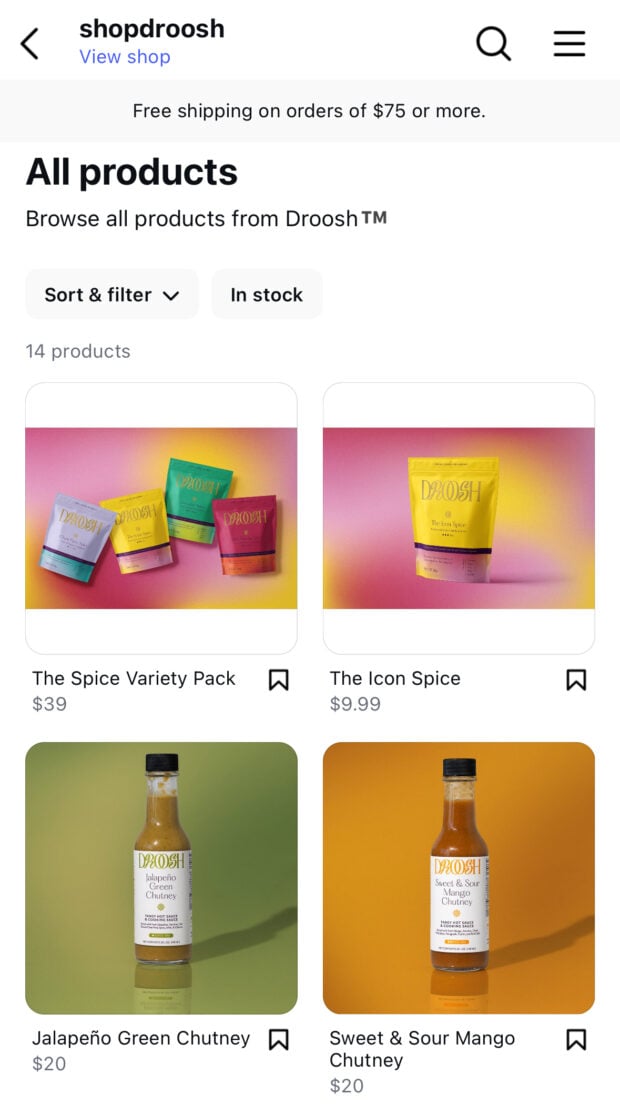
Source: @shopdroosh
Why Instagram Shops works:
- Brands can tag products directly in their Instagram photos and videos, and tapping the tag will bring a user to the product’s Shops listing.
- Just like IG posts and Reels, users can save Shops products to create wishlists.
- Posts with Shopping tags can be boosted easily using Instagram Ads.
- Shops provide valuable insights, so brands can see how well each product performs.
- Because anyone can tag a Shops product, Instagram Shops is a great tool for collaborating with influencers and creators — brand partnerships are made easier and more transparent.
2. Facebook
Facebook Shops works very similarly to Instagram Shops (they’re basically siblings, after all — Meta’s house, Meta’s rules). Just like on Instagram, users can access a company’s online storefront on Facebook and make purchases within the app.
PSA: Shopping on Facebook can be done on mobile only.
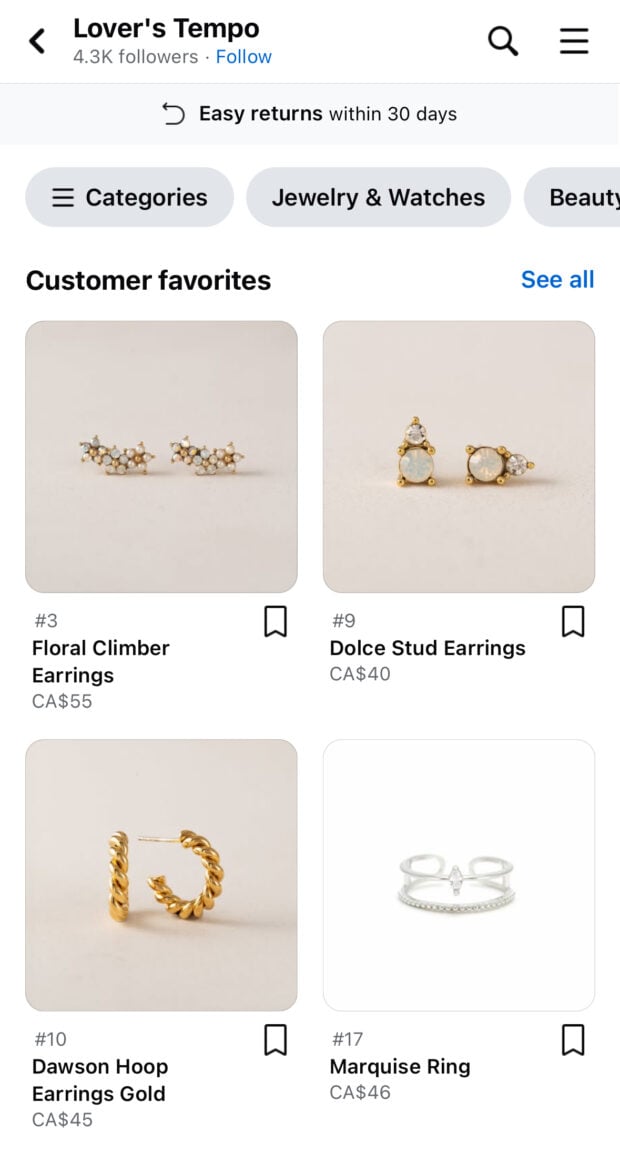
Source: @loverstempo
Why Facebook Shops works:
- Similar to Instagram Shops, product tags make it simple for users to go from browsing to buying.
- Using Facebook Ads, Shop products can be promoted and aimed at a particular target audience.
- Products that are published on Facebook Shops can show up on Facebook Marketplace (where Facebook users go specifically to shop).
3. TikTok
If your brand’s audience leans towards a younger crowd, definitely check out TikTok Shop — it’s available in select countries (Indonesia, Ireland, Malaysia, Mexico, the Philippines, Singapore, Spain, Thailand, the United Kingdom, the United States, and Vietnam) and allows buyers to checkout within the app. Businesses can tag products in their videos, including live videos.
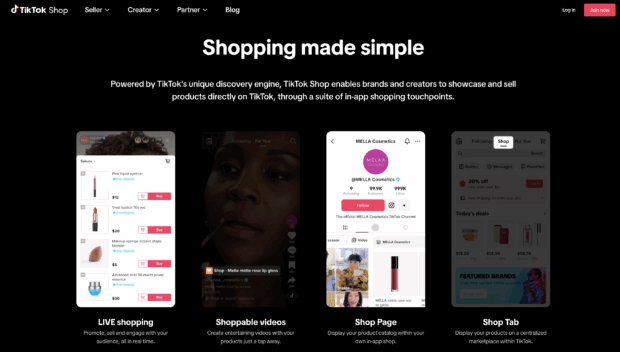
Source: business.tiktokshop.com
If you’re in a country that doesn’t have access to TikTok Shop yet (for example, Canada), you can still use TikTok as a platform for social commerce through TikTok for Business: via TikTok Ads, you can link to an e-commerce site in your video. The link will appear as a “Shop now” button.

Source: @nicole.delosreyes
Why TikTok Shop works:
- Shoppable videos provide users with direct links to products, and consumers can come across your product organically and checkout without leaving the app.
- Users can browse through your TikTok Shop on your profile page.
- For more intentional shoppers, the Shop Tab feature allows for searching and browsing.
- Live Shopping is a great way to form authentic connections with your audience and engage with potential buyers in real time.
4. YouTube
YouTube shopping is a somewhat underutilized platform compared to the others on this list, but don’t count it out — YouTube is the most used social media platform across all age groups, so shoppable products on YouTube have the potential to reach a very wide audience.
Additionally, YouTube shopping has product tags that show up during videos (so, when a cycling creator talks about a certain helmet, for example, a clickable link to that helmet would appear on the video screen).

Why YouTube Shopping works:
- Shopping buttons that pop up during videos are engaging — users will want to open them to see what they are. Plus, the video continues to play while the user browses your product, so shopping doesn’t interrupt streaming.
- You can promote more than one product per video (up to 30).
- Products appear on a “shelf” under your YouTube video, so even if a user closes the pop-up shopping button, they can still easily access your shop.
- Businesses or other users can promote products, which is a great opportunity for creators and brands to collaborate.
5. Pinterest
Pinterest is a place that social media users go to be inspired — they are already looking for something new and exciting when they open the app — which vibes excellently with shopping.
Pinterest’s take on social commerce is Product Pins. Essentially, product pins are shoppable pins that will link users directly to that product. When you tap “Visit Site” on a product pin, the brand’s e-commerce website will open within the Pinterest app.

Source: Pinterest
From a shopper’s perspective, Product Pins are very simple. They show up organically and in search, so they appear almost identical to other pins—the only difference is a little shopping tag icon.
Why Pinterest Product Pins work:
- Product pins are integrated almost seamlessly with regular pins, so they don’t appear like typical ads.
- Product pins are highly searchable and come up organically as users are scrolling.
- Product pins can be uploaded from a data source (as in, a spreadsheet with all your details on pricing, product info, etc.) so it’s easy to input lots of products at once — according to Pinterest, the platform can process up to 20 million products per retail catalog.
6. Snapchat
Snapchat stores allows users to shop for products within the Snapchat app. It’s only available for brands that have a verified business profile. The store shows up in a Shop tab on its profile, similar to Facebook and Instagram Shops.
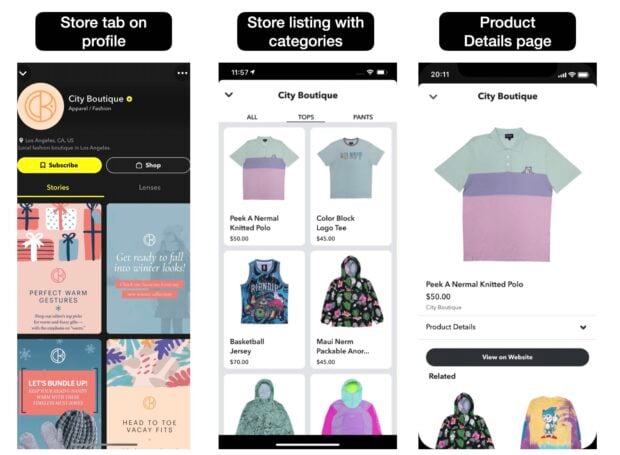
Source: Snapchat
Why Snapchat stores work:
- Brands can tag products in their Snapchat stories, driving traffic to their shoppable items.
- Users can subscribe to Snapchat stores and be notified of new products or sales.
- Snapchat is the communication platform of choice for Gen Z (many prefer it over texting). So, if your target audience is Gen Z age, you can find them on Snapchat.
1. Strawberry Milk Mob
Swimwear brand Strawberry Milk Mob has an notableTikTok presence (2.4 million followers) and effectively uses social media to generate a lot of hype around sales, promotions and new product drops — like this behind-the-scenes video.
Why this works:
- This video shows how social media can build buzz around a product before it’s even available.
- The TikTok has a very honest, authentic vibe, with the brand’s founder showing up and genuinely sharing her excitement about the drop.
- The video asks for any advice regarding the brand’s website design, giving followers an opportunity to share opinions (and more comments = better engagement).
2. Silk and Snow
Silk and Snow’s social content often focuses on the dreamier elements of the mattress and linen business (relaxing, slow videos of people making beds and cozying in) but this collaboration with biathlete Benjamin Brousseau has a very different vibe.
Why this works:
- The Reel uses Instagram’s “Paid partnership” label and follows all of the platform’s guidelines for ads, ensuring the promotion won’t be removed for violating any rules.
- The caption uses keywords that people may search for when looking for a mattress (plush, memory foam, hybrid mattress) so it’s great for social SEO.
- The Reel shows off the versatility of the brand (everyone sleeps!) and switches up the usually serene aesthetic with clips of a professional athlete training.
3. Miss Jacobs Little Learners
Despite being far out of school and not having any school-aged kids of my own, I am obsessed with classroom organization videos, and Miss Jacobs Little Learners has plenty of ultra-satisfying TikToks:
Why this works:
- This TikTok uses the “Shop now” button, instantly driving traffic to the brand’s e-commerce site and making it easy for viewers to purchase the product.
- The video exemplifies a show, don’t tell strategy: instead of talking about how great the product is, it shows the classroom labels in action.
- The video has over 5,000 saves, meaning that TikTok users found it inspiring and worth coming back to… even if they’re many years away from a classroom.
4. Go Whistler
This tourism company capitalizes on the visual-focused Pinterest by publishing pins that combine text and images for informative, save-worthy content, like this “Local’s List” pin.
Why this works:
- This pin has useful, evergreen information that people will want to save, which increases its chances of appearing organically on Pinterest.
- While the image for this pin is general, the caption of this pin is optimized for search, using words like “wildflowers,” “bike trails” and “Crankworx” (a popular mountain bike festival in August).
- The brand is selling an experience, not a product, but demonstrates how stunning visuals can communicate a feeling that people are willing to travel for — in other words, it pays to get a good photographer.
5. Jade Leaf Matcha
This organic Japanese matcha brand collaborates with creators (and celebrities) to market a very aesthetic product — perfect for Instagram’s audience. This partnership with @allthingslillyann uses is a great example.
Why this works:
- Instagram shopping tags show viewers that the product in the video is shoppable.
- This product starts with a hook that’s not too sales-y: “The best hack for blueberry matchas at home.”
- The video is educational (and therefore, valuable) to viewers even if they don’t end up buying the product, instead, they may save the post, which is also good for the brand’s engagement and ranking.
(Psst: the communications manager of Jade Leaf Matcha offers her social commerce tips later on in this post).
1. Boost brand awareness
Social media is an incredible tool for increasing awareness, personally, the only reason I’m know the grip strength of chinchillas is due to social media.
When you use social commerce, you’re meeting your audience where they’re already at, and getting more content-hungry eyes on your brand.
2. Target the right people
Unlike more traditional forms of advertising (we see you, billboards, and blimps), social commerce allows you to target specific demographics and communities.
When you place ads on social platforms, you can select the age, gender, location, and even interests you’d like to target. That way you can be sure that your eco-friendly drink koozie ads are showing up on the feeds of 30-something Americans who love watching football and taking care of the planet.
3. Increase sales
Hey, that’s the bottom line, right? Using social commerce can help you make more money and grow your brand.
When you’re effectively reaching your target audience on social media (instead of just shouting about your brand into the abyss, real or imagined), people are more likely to buy your product and support your brand — and, you know, give you their money.
We asked Siona Baldwin, Communications Manager of Jade Leaf Matcha, to stir up some social commerce advice. Jade Leaf Matcha makes the most of every opportunity to sell on Instagram, Facebook, TikTok and more — here’s how.
1. Be descriptive in your product information
When it comes to filling out the text fields, Baldwin suggests thinking of your “Product Info” section like a mini landing page. “Don’t just add the basics, like price or size,” she says. “Add short additional selling points about why the product is special.”
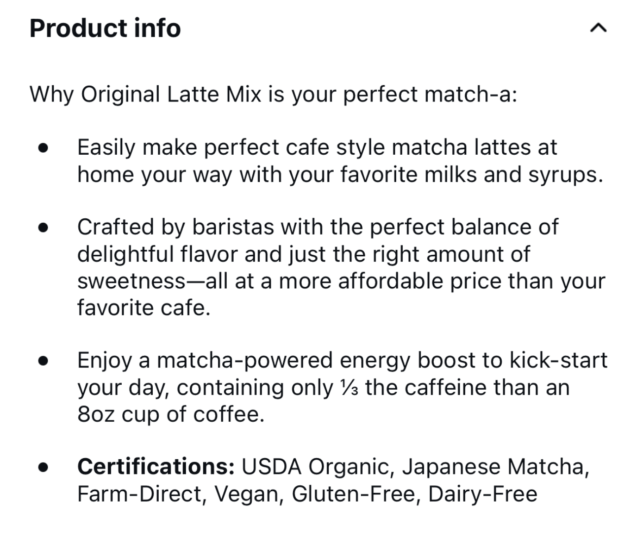
Source: @jadeleafmatcha
Jade Leaf Matcha, for example, includes caffeine content, a flavor description, certifications (like USDA Organic), and reasons why it’s a good coffee alternative: “It helps convert new customers who are just discovering matcha,” Baldwin explains.
Not only will a good product description give a potential buyer more information about your product, it will also give the social platform’s search engines and ranking system (otherwise known as the algorithm) the data it needs to show your content to the right audience.
Speaking of ranking…
2. Use relevant hashtags
Strategic hashtagging can also make sure that your social commerce content ends up on the feeds of the right people. Hashtags help the platform understand what your content is about and who it’s relevant to.
For Jade Leaf Matcha, Baldwin uses a mix of broad and niche hashtags (#matcha, #matchalatte) and also incorporates lifestyle and seasonal hashtags (#matchagirlie, #summerdrinks). “We like to update hashtags based on trends and tailor them to our product benefits, like #energyboost,” Baldwin shares.
3. Create social media hype around sales and new launches
Not all of your social commerce content needs to link directly to a product. In fact, generating some buzz about a new offering before it’s available can be really effective (as in the Strawberry Milk Mob example we referenced earlier).
“We love to start teasing new products 1-2 weeks before the launch,” Baldwin says. Jade Leaf Matcha uses sneak peeks, countdowns, and “something new is coming” hints to stimulate interest and even rewards early buyers with exclusive discounts.
Creating hype can be as simple as eating a cookie:
Baldwin points to the brand’s launch of Vanilla & Strawberry Matcha Lattes as another example: cryptic hints about flavor and close-up product shots were posted ahead of the official release. “By the time launch day hit, people were ready — and the excitement helped us have a huge summer kickoff,” she shares.
4. Collaborate with creators and influencers
Take a quick scroll through Jade Leaf Matcha’s feed, and you’ll likely recognize actress Lili Reinhart, who has partnered with the brand to promote their products. Celebrity collabs aren’t within reach for every brand, but even small brands looking to partner with micro-influencers can learn from this social commerce strategy.
“Partner with influencers who genuinely align with your brand values and target audience,” Baldwin advises. She explains why Lili Reinhart is perfect for Jade Leaf Matcha: “she’s passionate about mental health, self-love, and she’s a longtime matcha lover.”
Value alignment will help your partner incorporate your brand naturally into their existing content — for example, Lili Reinhart’s ASMR matcha video.
5. Leverage user-generated content
“UGC is a game-changer for building trust faster than traditional ads,” says Baldwin, adding that user-generated content creates a more authentic, relatable brand experience. Plus, it’s great for businesses that have smaller marketing budgets or limited resources.
Jade Leaf Matcha incorporated UGC into paid promotions for their National Matcha Day sale.
“We tested three different hooks to see which one performed best, then shifted our spend to the winning creative,” Baldwin explains. “This approach helped optimize our performance and increase sales.”
Schedule posts for the right time
Using Hootsuite, you can schedule your posts to go live when the majority of your audience is online. This gives your social marketing campaigns the most visibility and the best chance of reaching shoppers.
Monitor brand mentions and engagement
Don’t let people talk about you behind your back — Hootsuite’s social listening tech enables you to monitor brand mentions and measure your engagement so you can be part of the conversation and know what the buzz is about.
Analyze performance metrics
There’s no one way to succeed with social commerce, but Hootsuite analytics will tell you exactly how your content is performing. It’s the simplest way to figure out what’s working and what’s not… and know which social commerce strategies to invest further in.
Save time managing your social media presence with Hootsuite. Publish and schedule posts, find relevant conversions, engage your audience, measure results, and more — all from one dashboard. Try it free today.







